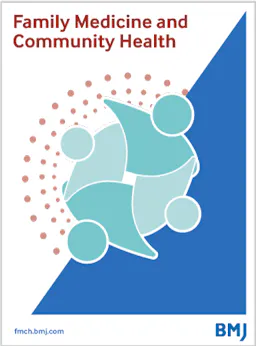在家庭医学中讨论月经健康问题
IF 4.3
3区 医学
Q1 PRIMARY HEALTH CARE
引用次数: 0
摘要
月经健康是许多顺性别女性、跨性别男性和非二元人群的一般生理标志。尽管一半以上的人口都有月经,但在整个医学界,围绕月经健康的污名化、缺乏交流和迫切的社会需求依然存在。本文章由计算机程序翻译,如有差异,请以英文原文为准。
Discussing menstrual health in family medicine
Menstrual health is a general biological marker for many cisgender women, transgender men and non-binary people. Despite more than half of the population being people who menstruate, stigma, lack of conversation and pressing social needs around menstrual health persists throughout medicine.[1][1]
求助全文
通过发布文献求助,成功后即可免费获取论文全文。
去求助
来源期刊

Family Medicine and Community Health
PRIMARY HEALTH CARE-
CiteScore
9.70
自引率
0.00%
发文量
27
审稿时长
19 weeks
期刊介绍:
Family Medicine and Community Health (FMCH) is a peer-reviewed, open-access journal focusing on the topics of family medicine, general practice and community health. FMCH strives to be a leading international journal that promotes ‘Health Care for All’ through disseminating novel knowledge and best practices in primary care, family medicine, and community health. FMCH publishes original research, review, methodology, commentary, reflection, and case-study from the lens of population health. FMCH’s Asian Focus section features reports of family medicine development in the Asia-pacific region. FMCH aims to be an exemplary forum for the timely communication of medical knowledge and skills with the goal of promoting improved health care through the practice of family and community-based medicine globally. FMCH aims to serve a diverse audience including researchers, educators, policymakers and leaders of family medicine and community health. We also aim to provide content relevant for researchers working on population health, epidemiology, public policy, disease control and management, preventative medicine and disease burden. FMCH does not impose any article processing charges (APC) or submission charges.
 求助内容:
求助内容: 应助结果提醒方式:
应助结果提醒方式:


